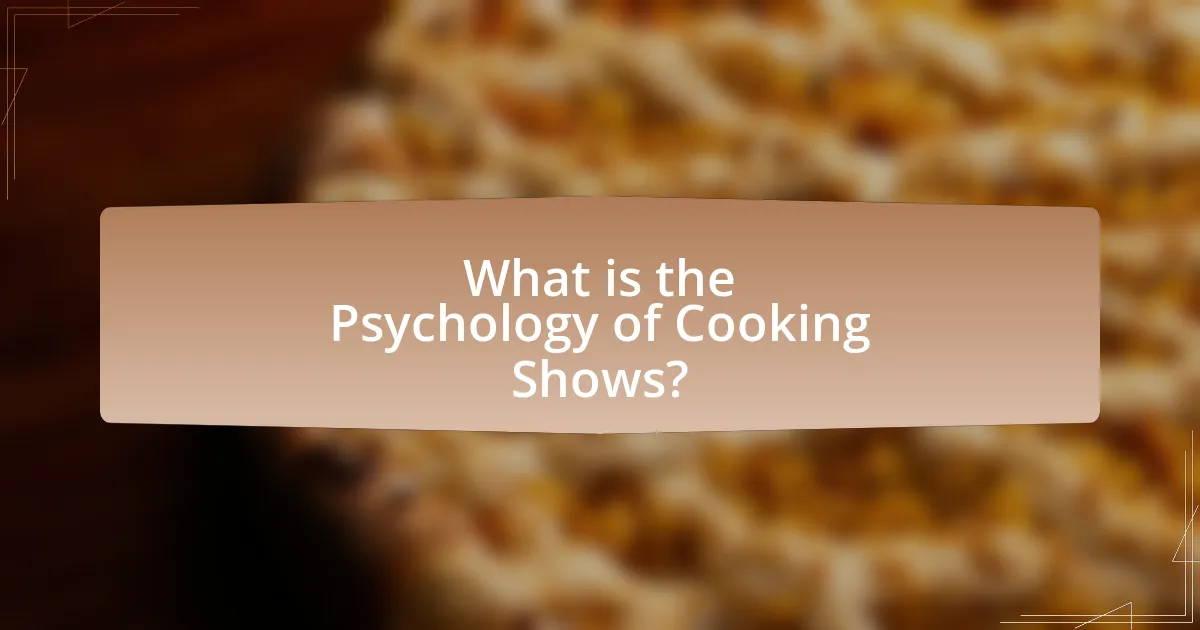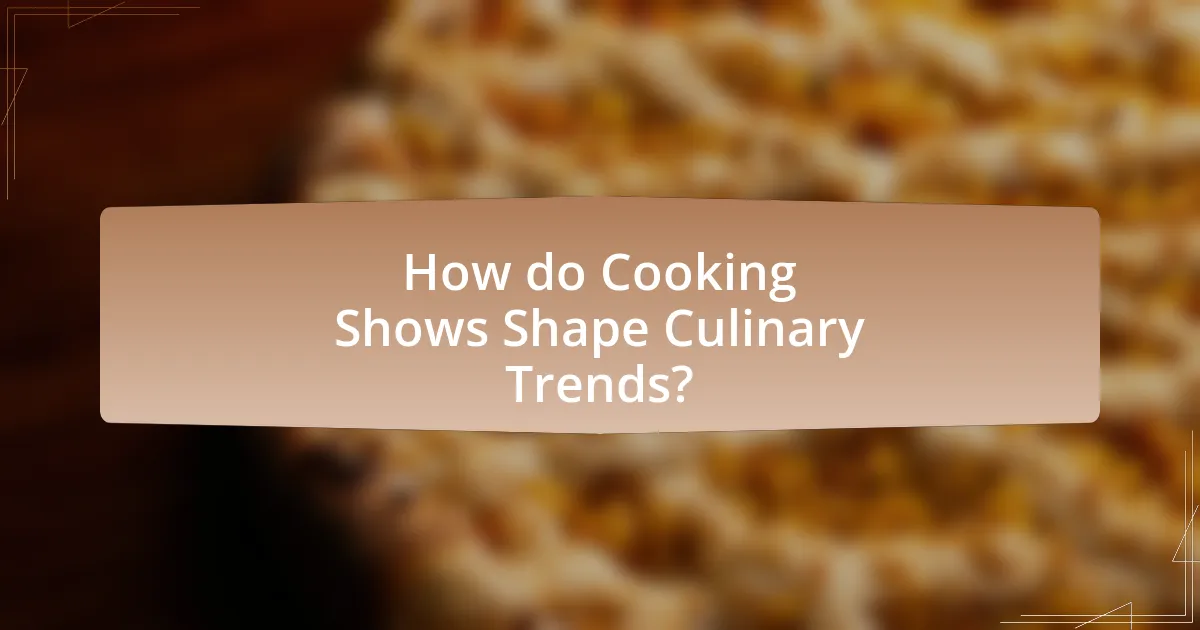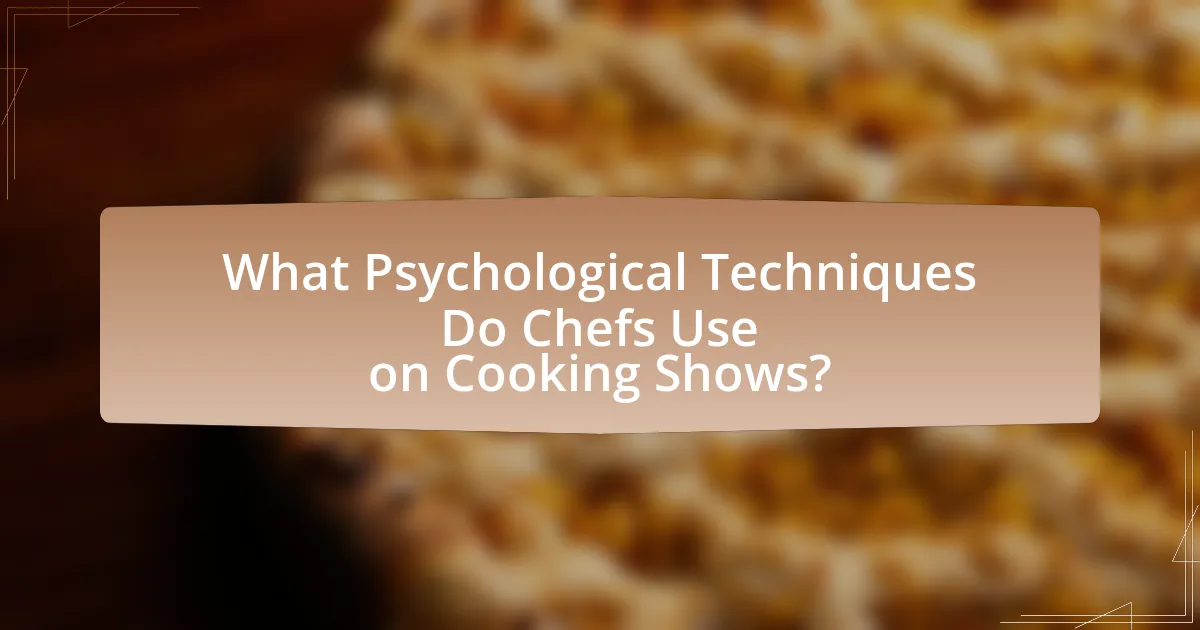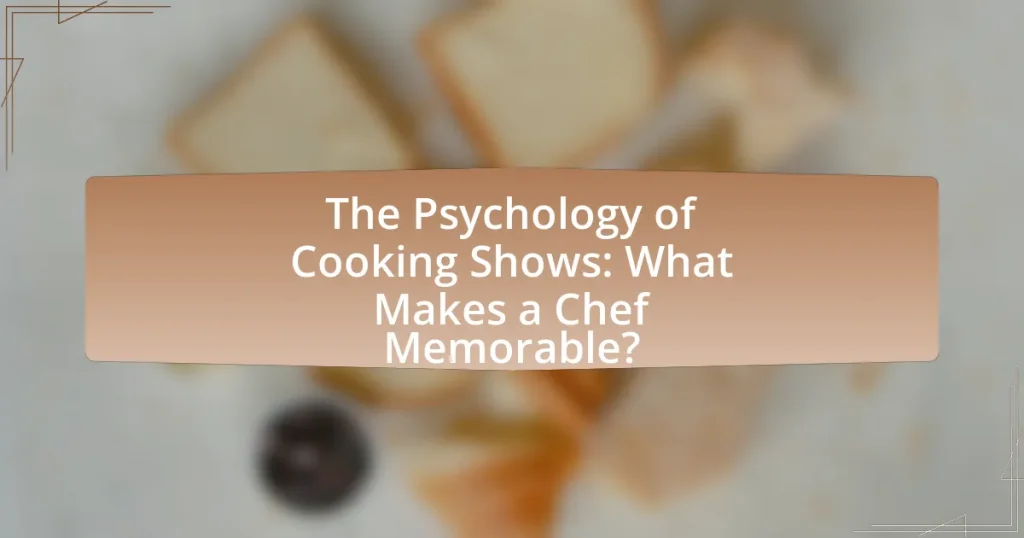The main entity of the article is the psychology of cooking shows and their impact on viewer perceptions of chefs. The article explores how cooking shows evoke emotional and cognitive responses, enhancing viewers’ moods and inspiring them to cook. It examines the influence of chefs’ charisma, storytelling, and emotional engagement on their memorability and public image. Additionally, the article discusses how cooking shows shape culinary trends, affect food culture, and influence the culinary industry, highlighting the psychological techniques chefs use to connect with audiences and the competitive elements that drive viewer engagement.

What is the Psychology of Cooking Shows?
The psychology of cooking shows revolves around the emotional and cognitive responses they elicit from viewers. These shows often create a sense of nostalgia, comfort, and aspiration, as they connect food with personal memories and cultural identity. Research indicates that cooking shows can enhance viewers’ mood and inspire them to engage in cooking themselves, fostering a sense of community and shared experience. For instance, a study published in the journal “Appetite” found that watching cooking shows can increase viewers’ motivation to cook and try new recipes, highlighting the influence of visual and narrative elements on behavior.
How do cooking shows influence viewer perceptions of chefs?
Cooking shows significantly influence viewer perceptions of chefs by shaping their image as skilled, relatable, and charismatic figures. These programs often highlight chefs’ culinary expertise through demonstrations and competitions, which can enhance viewers’ admiration for their skills. Additionally, the personal stories and interactions presented in these shows create a sense of connection, making chefs appear more approachable and human. Research indicates that viewers often develop emotional attachments to chefs, influenced by their on-screen personalities and the narratives constructed around them, leading to a perception that combines both professional competence and personal relatability.
What psychological factors contribute to a chef’s memorability?
A chef’s memorability is significantly influenced by their charisma, storytelling ability, and emotional connection with the audience. Charisma enhances a chef’s presence, making them more engaging and relatable, which is crucial in cooking shows where personality often drives viewer loyalty. Storytelling allows chefs to share personal experiences and cultural backgrounds, creating a narrative that resonates with viewers and fosters a deeper connection. Emotional connection, facilitated by authenticity and vulnerability, encourages viewers to invest in the chef’s journey, making them more memorable. Research indicates that emotional engagement can enhance memory retention, suggesting that chefs who evoke strong feelings are more likely to be remembered by their audience.
How do emotions play a role in the viewer’s connection to chefs?
Emotions significantly enhance the viewer’s connection to chefs by fostering relatability and authenticity. When chefs express genuine passion, vulnerability, or joy during cooking, viewers are more likely to empathize and feel a personal connection. Research indicates that emotional storytelling in culinary shows can evoke feelings of nostalgia or comfort, which strengthens viewer engagement. For instance, a study published in the Journal of Consumer Research found that emotional narratives in food-related media can lead to increased viewer loyalty and attachment to the chef. This emotional resonance not only makes the chef memorable but also influences viewers’ perceptions of their culinary skills and personality.
What elements make a chef stand out in cooking shows?
A chef stands out in cooking shows primarily through their unique personality, culinary skills, and ability to connect with the audience. Unique personality traits, such as charisma and humor, engage viewers and create memorable moments. Culinary skills, including creativity and technical proficiency, showcase their expertise and innovation in the kitchen. Additionally, the ability to communicate effectively and share personal stories fosters a connection with the audience, making the chef relatable and memorable. For instance, chefs like Gordon Ramsay and Julia Child have become iconic due to their distinctive styles and engaging presentations, which resonate with viewers and enhance their appeal on cooking shows.
How does charisma impact a chef’s appeal on screen?
Charisma significantly enhances a chef’s appeal on screen by fostering a connection with the audience, making the chef more relatable and engaging. Charismatic chefs often exhibit traits such as confidence, enthusiasm, and authenticity, which can captivate viewers and create a memorable presence. Research indicates that audiences are more likely to remember and enjoy shows featuring charismatic personalities, as these traits evoke positive emotions and increase viewer loyalty. For instance, a study published in the Journal of Consumer Research found that charismatic individuals are perceived as more trustworthy and likable, which directly influences audience engagement and retention in cooking shows.
What role does storytelling play in a chef’s memorability?
Storytelling significantly enhances a chef’s memorability by creating emotional connections with the audience. When chefs share personal anecdotes, cultural backgrounds, or the inspiration behind their dishes, they engage viewers on a deeper level, making their culinary experiences more relatable and impactful. Research indicates that narratives can improve memory retention; for instance, a study published in the journal “Cognitive Science” found that stories are more effective than facts alone in helping individuals remember information. This connection through storytelling not only distinguishes chefs in a competitive industry but also fosters loyalty among their audience, as people are more likely to remember and return to chefs who resonate with them personally.
Why do certain chefs become cultural icons?
Certain chefs become cultural icons due to their unique culinary skills, charismatic personalities, and ability to connect with audiences. These chefs often innovate traditional cooking methods, creating signature dishes that resonate with the public, such as Julia Child’s introduction of French cuisine to American households. Their presence on television and social media amplifies their influence, allowing them to build a personal brand that transcends cooking, as seen with chefs like Gordon Ramsay and Rachael Ray. Additionally, their ability to engage with cultural trends and social issues, such as sustainability and health, further solidifies their status as icons in popular culture.
What traits do memorable chefs share?
Memorable chefs share traits such as creativity, charisma, and a strong work ethic. Creativity allows them to innovate and present unique dishes that captivate audiences, while charisma helps them connect with viewers, making their cooking relatable and engaging. A strong work ethic ensures they consistently deliver high-quality food and maintain professionalism in high-pressure environments. These traits contribute to their ability to stand out in a competitive culinary landscape, as evidenced by successful chefs like Gordon Ramsay and Julia Child, who have built their brands around these characteristics.
How does media portrayal affect a chef’s public image?
Media portrayal significantly influences a chef’s public image by shaping audience perceptions and expectations. Positive media representation, such as featuring chefs in popular cooking shows or favorable articles, enhances their reputation, leading to increased popularity and business opportunities. Conversely, negative portrayals, such as scandals or poor reviews, can damage a chef’s credibility and diminish their public standing. For instance, a study published in the Journal of Culinary Science and Technology found that chefs who received positive media coverage experienced a 30% increase in customer engagement and sales, highlighting the direct impact of media on their public image.

How do Cooking Shows Shape Culinary Trends?
Cooking shows shape culinary trends by popularizing specific cuisines, techniques, and ingredients through visual storytelling and celebrity chef influence. These shows often introduce viewers to new food concepts, making them more accessible and desirable. For instance, the rise of plant-based diets has been significantly influenced by cooking shows that feature vegan recipes, leading to a 600% increase in plant-based food sales in the U.S. from 2014 to 2019, according to a report by the Good Food Institute. Additionally, cooking competitions and reality formats create a sense of urgency and excitement around culinary innovation, prompting viewers to experiment with their cooking at home, thereby driving trends in home cooking and dining.
What impact do cooking shows have on food culture?
Cooking shows significantly influence food culture by shaping public perceptions of cuisine and cooking practices. They introduce diverse culinary techniques and ingredients to a broad audience, often leading to increased interest in global cuisines. For instance, shows like “MasterChef” and “Top Chef” have popularized gourmet cooking at home, encouraging viewers to experiment with complex recipes and elevate their cooking skills. Research indicates that cooking shows can enhance food literacy, as viewers learn about nutrition, food sourcing, and preparation methods, ultimately impacting their dietary choices and preferences.
How do chefs influence home cooking practices through television?
Chefs influence home cooking practices through television by demonstrating techniques, sharing recipes, and creating relatable content that inspires viewers to cook. Television cooking shows often feature chefs who showcase step-by-step processes, making complex dishes accessible and encouraging viewers to replicate them at home. For example, shows like “The Barefoot Contessa” and “MasterChef” have popularized specific cooking styles and ingredients, leading to increased home cooking engagement. Research indicates that exposure to cooking shows can enhance culinary skills and confidence, as viewers often report trying new recipes after watching their favorite chefs.
What trends have emerged from popular cooking shows?
Trends that have emerged from popular cooking shows include an increased focus on diverse cuisines, the rise of home cooking, and the integration of health-conscious recipes. These trends reflect viewers’ growing interest in global flavors, as evidenced by shows featuring international chefs and regional dishes. Additionally, the COVID-19 pandemic accelerated the popularity of home cooking, with many shows adapting to showcase simple, accessible recipes that viewers can replicate. Health-conscious cooking has also gained traction, with programs highlighting plant-based diets and nutritional awareness, aligning with a broader societal shift towards healthier eating habits.
How do cooking shows affect the culinary industry?
Cooking shows significantly influence the culinary industry by shaping consumer preferences and trends. These shows introduce viewers to diverse cuisines, cooking techniques, and food presentation styles, which often lead to increased interest in specific ingredients and dishes. For instance, the rise of shows like “MasterChef” and “Top Chef” has popularized gourmet cooking at home, resulting in a surge in sales of kitchen gadgets and specialty ingredients. According to a report by the NPD Group, cooking show viewership correlates with a 20% increase in home cooking activities, demonstrating their impact on consumer behavior and the culinary market.
What is the relationship between cooking shows and restaurant success?
Cooking shows significantly influence restaurant success by enhancing brand visibility and consumer interest. Restaurants featured on popular cooking shows often experience increased foot traffic and sales due to heightened public awareness and credibility. For instance, a study by the National Restaurant Association found that 70% of consumers are more likely to visit a restaurant after seeing it on a cooking show. This correlation indicates that cooking shows serve as effective marketing platforms, leveraging the chefs’ personalities and culinary skills to attract diners.
How do chefs leverage their television presence for business opportunities?
Chefs leverage their television presence for business opportunities by enhancing their brand visibility and credibility, which leads to increased revenue streams. Through appearances on cooking shows, chefs can showcase their culinary skills, connect with audiences, and build a loyal following. This visibility often translates into opportunities such as book deals, product endorsements, and restaurant partnerships. For instance, celebrity chefs like Gordon Ramsay and Rachael Ray have successfully expanded their businesses by launching cookbooks and kitchenware lines, capitalizing on their television fame to attract consumers.

What Psychological Techniques Do Chefs Use on Cooking Shows?
Chefs on cooking shows utilize various psychological techniques to engage viewers and enhance their memorability. One prominent technique is storytelling, where chefs share personal anecdotes or the history behind a dish, creating an emotional connection with the audience. This method is supported by research indicating that narratives can significantly increase viewer retention and engagement (Green & Brock, 2000).
Another technique is the use of sensory language, which evokes taste, smell, and texture, making the cooking process more vivid and appealing. Studies show that descriptive language can enhance the viewer’s experience and stimulate appetite (Spence, 2015).
Additionally, chefs often employ humor and charisma to build rapport with the audience, making them more relatable and memorable. This aligns with findings that suggest positive emotions can enhance viewer enjoyment and loyalty (Fredrickson, 2001).
Lastly, competitive elements, such as time constraints and challenges, create suspense and excitement, keeping viewers invested in the outcome. Research indicates that competition can heighten emotional responses and engagement levels (Kahn et al., 2015).
These techniques collectively contribute to the effectiveness of chefs in cooking shows, making them not only skilled cooks but also captivating entertainers.
How do chefs engage viewers emotionally during their shows?
Chefs engage viewers emotionally during their shows by sharing personal stories and experiences related to the dishes they prepare. This storytelling creates a connection that resonates with the audience, making the cooking process more relatable and meaningful. For instance, chefs often discuss their cultural backgrounds or family traditions associated with specific recipes, which can evoke nostalgia and warmth in viewers. Research indicates that emotional storytelling can enhance viewer engagement and retention, as it activates areas of the brain associated with empathy and memory. By combining culinary skills with emotional narratives, chefs effectively foster a deeper connection with their audience, making their shows memorable and impactful.
What techniques do chefs use to create suspense and excitement?
Chefs create suspense and excitement through techniques such as timed challenges, unexpected ingredient reveals, and dramatic plating. Timed challenges, like those seen in competitive cooking shows, heighten tension as chefs race against the clock, which can lead to mistakes and surprises. Unexpected ingredient reveals, where chefs must incorporate mystery items into their dishes, add an element of unpredictability that keeps both the chefs and the audience engaged. Dramatic plating, where chefs present their dishes in visually striking ways, enhances the anticipation of tasting the food, making the experience more thrilling. These techniques are effective because they engage viewers emotionally, creating a sense of urgency and curiosity that enhances the overall viewing experience.
How do chefs build rapport with their audience?
Chefs build rapport with their audience by engaging them through storytelling, humor, and interactive cooking demonstrations. This connection is strengthened when chefs share personal anecdotes related to their culinary experiences, making the audience feel more involved and invested in the cooking process. Research indicates that emotional engagement enhances viewer retention and enjoyment, as seen in studies on audience interaction in cooking shows, which highlight that chefs who incorporate relatable narratives and humor tend to create a more memorable viewing experience.
What role does competition play in cooking shows?
Competition serves as a central element in cooking shows by driving engagement and enhancing viewer interest. The competitive format creates tension and excitement, compelling audiences to invest emotionally in the contestants’ journeys. Research indicates that competition fosters a sense of urgency and stakes, which can lead to higher viewer ratings; for instance, shows like “MasterChef” and “Top Chef” have consistently ranked among the most-watched programs in their time slots due to their competitive nature. Additionally, competition encourages contestants to showcase their culinary skills and creativity under pressure, often resulting in innovative dishes that captivate both judges and viewers.
How does the competitive format affect viewer engagement?
The competitive format significantly enhances viewer engagement by creating suspense and emotional investment. This format encourages audiences to root for their favorite contestants, leading to increased attachment and anticipation for outcomes. Research indicates that competitive elements, such as time constraints and direct comparisons between participants, heighten excitement and keep viewers returning for more episodes. For instance, a study published in the Journal of Broadcasting & Electronic Media found that reality competition shows, including cooking competitions, attract higher viewer ratings due to their dynamic and unpredictable nature, which fosters a sense of community among fans as they discuss and debate contestants’ performances.
What psychological effects does competition have on chefs and viewers?
Competition has significant psychological effects on both chefs and viewers, primarily inducing stress and motivation in chefs while enhancing engagement and emotional investment in viewers. Chefs often experience heightened anxiety and pressure to perform, which can lead to both positive outcomes, such as increased focus and creativity, and negative outcomes, such as burnout or decreased self-esteem. Research indicates that competitive environments can trigger the release of cortisol, a stress hormone, which affects decision-making and performance (Kivlighan et al., 2006).
For viewers, competition fosters a sense of excitement and suspense, leading to increased viewer engagement and emotional responses. Studies show that audiences are more likely to form attachments to contestants in competitive formats, as they experience vicarious emotions and investment in the outcomes (Teng et al., 2015). This emotional connection can enhance the overall viewing experience, making the competition more memorable and impactful.
What are some best practices for aspiring chefs on cooking shows?
Aspiring chefs on cooking shows should focus on showcasing their unique culinary style while maintaining strong communication skills. Demonstrating a distinct cooking style helps chefs stand out in a competitive environment, as evidenced by successful contestants who often highlight their cultural backgrounds or signature dishes. Additionally, effective communication, including clear explanations of cooking techniques and engaging storytelling, enhances viewer connection and retention, which is crucial for memorable performances. Research indicates that contestants who articulate their thought processes and engage with the audience tend to leave a lasting impression, thereby increasing their chances of success on cooking shows.
How can chefs develop their on-screen persona effectively?
Chefs can develop their on-screen persona effectively by focusing on authenticity, charisma, and relatability. Authenticity allows chefs to connect with audiences by showcasing their true selves, which fosters trust and loyalty. Charisma enhances their presence, making them more engaging and memorable; studies show that viewers are drawn to personalities that exude confidence and enthusiasm. Relatability is crucial, as chefs who share personal stories or struggles resonate more with viewers, creating a deeper emotional connection. For instance, celebrity chef Gordon Ramsay combines these elements by being both authoritative and approachable, which has contributed to his widespread appeal and success in cooking shows.
What strategies can chefs use to connect with their audience?
Chefs can connect with their audience by utilizing storytelling, engaging with viewers through social media, and showcasing their personality. Storytelling allows chefs to share personal experiences and cultural backgrounds, making their cooking relatable and memorable. Engaging with viewers on platforms like Instagram or TikTok fosters a sense of community and allows chefs to respond to audience feedback in real-time. Additionally, showcasing their personality through humor or authenticity helps to create a more personal connection, making the chef more relatable and memorable. These strategies are supported by research indicating that emotional engagement enhances viewer retention and loyalty in culinary programming.










